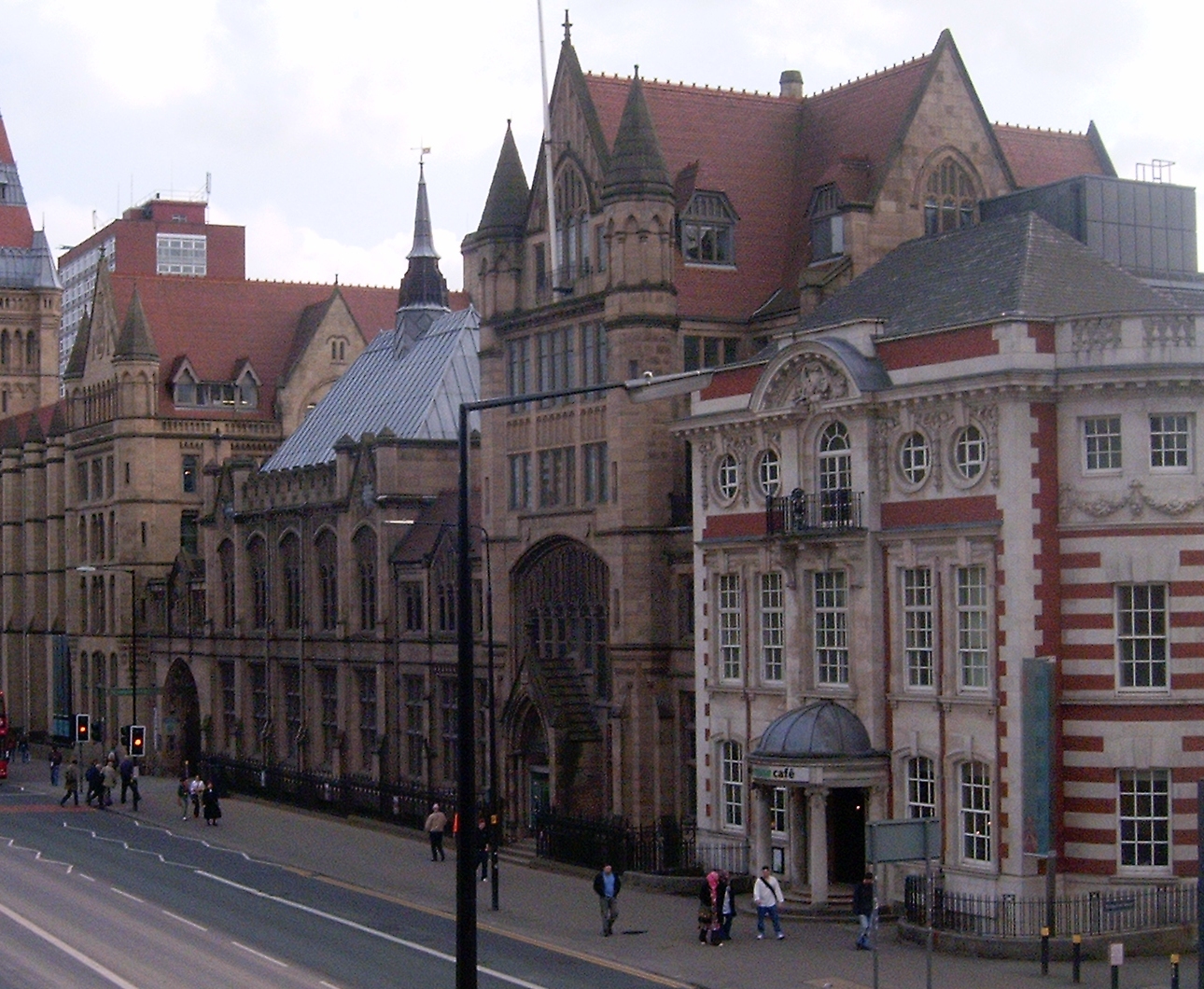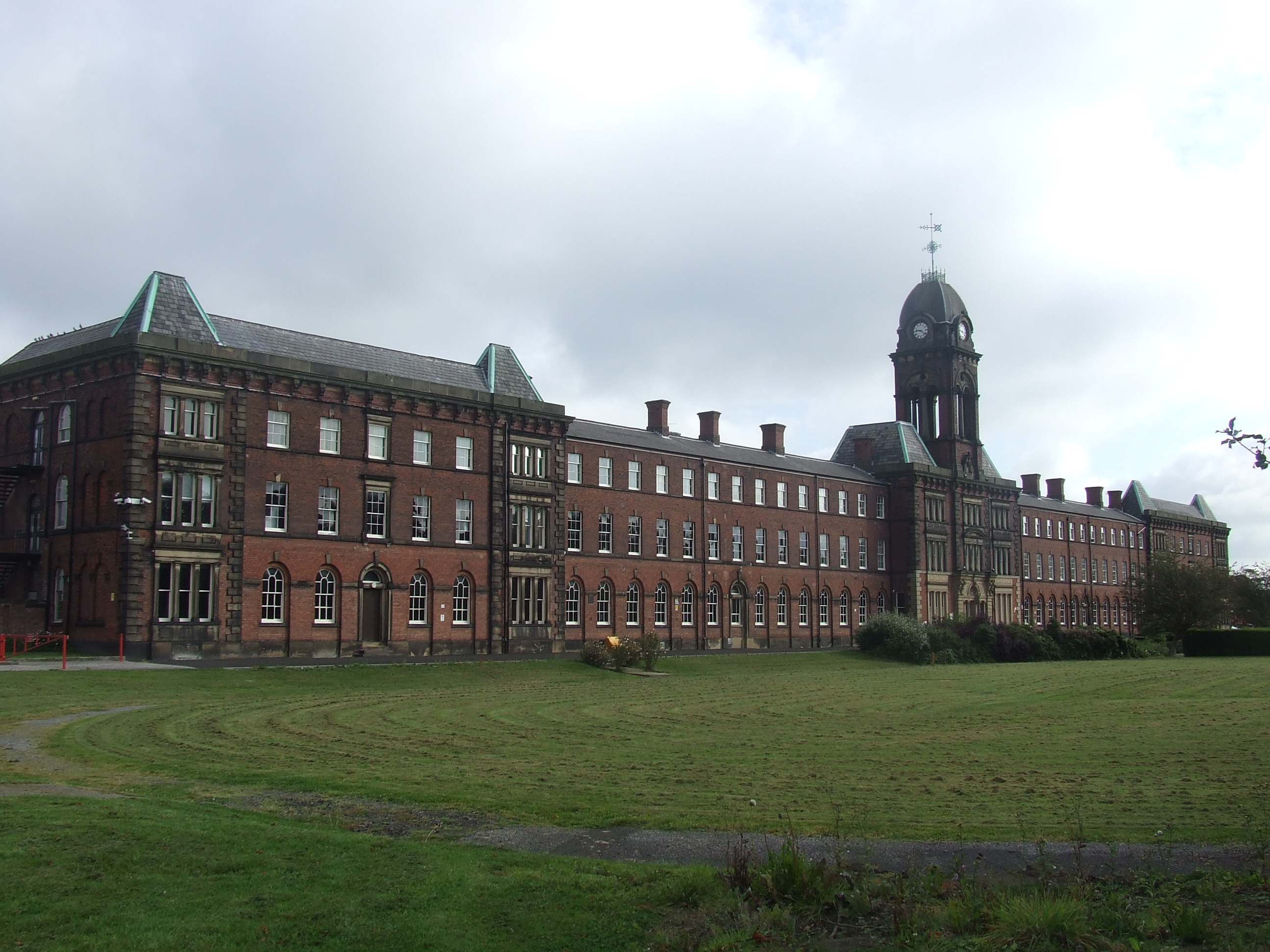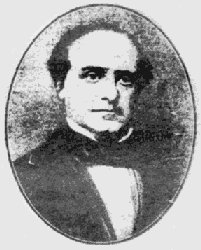|
Mortimer Grimshaw
Mortimer Grimshaw ( 1826 – 22 December 1869) was an English political activist, strike leader and cotton weaver. He briefly attained national fame in the 1850s due to his part in the Preston strike of 1853–54. A large man whose face was marked by smallpox, he was renowned for his oratory, which earned him the nickname of the "Thunderer of Lancashire". The son of a radical public speaker and orator, Grimshaw's early campaigns were centred on the improvement of working conditions for the mill-workers in the village of Royton and enforcement of the Factory Acts. He was an outspoken critic of the Whig Party and an advocate of the Chartist movement, in particular of their anti-Whig alliance with the Tory Party. Strikes among mill-workers began to break out during the early 1850s and Grimshaw was one of the leaders, along with George Cowell, of the strike in Preston in 1853. The strikers were fruitless in their demands for a ten per cent wage increase, and Grimshaw found himsel ... [...More Info...] [...Related Items...] OR: [Wikipedia] [Google] [Baidu] |
Great Harwood
Great Harwood is a town in the Hyndburn district of Lancashire, England, located north east of Blackburn and adjacent to the Ribble Valley. Great Harwood is the major conurbation of the 'Three Towns'; the three towns being Great Harwood, Clayton-le-Moors, and Rishton. In 2001, the town had a population of 11,220, which decreased to 10,800 at the census of United Kingdom Census 2011, 2011. History Great Harwood is a town with an industrial heritage. The Mercer Hall Leisure Centre in Queen Street, and the town clock, pay tribute to John Mercer (scientist), John Mercer (1791–1866), the 'father' of Great Harwood, who revolutionised the cotton dyeing process with his invention of mercerisation. The cotton industry became the main source of employment in the town, and by 1920, the Great Harwood Weavers' Association had more than 5,000 members. The town was once on the railway line from Great Harwood Loop#History, Blackburn to Burnley via Padiham – ''The North Lancs or Great Harwo ... [...More Info...] [...Related Items...] OR: [Wikipedia] [Google] [Baidu] |
Oldham
Oldham is a large town in Greater Manchester, England, amid the Pennines and between the rivers Irk and Medlock, southeast of Rochdale and northeast of Manchester. It is the administrative centre of the Metropolitan Borough of Oldham, which had a population of 237,110 in 2019. Within the boundaries of the historic county of Lancashire, and with little early history to speak of, Oldham rose to prominence in the 19th century as an international centre of textile manufacture. It was a boomtown of the Industrial Revolution, and among the first ever industrialised towns, rapidly becoming "one of the most important centres of cotton and textile industries in England." At its zenith, it was the most productive cotton spinning mill town in the world,. producing more cotton than France and Germany combined. Oldham's textile industry fell into decline in the mid-20th century; the town's last mill closed in 1998. The demise of textile processing in Oldham depressed and heavily ... [...More Info...] [...Related Items...] OR: [Wikipedia] [Google] [Baidu] |
American Civil War
The American Civil War (April 12, 1861 – May 26, 1865; also known by other names) was a civil war in the United States. It was fought between the Union ("the North") and the Confederacy ("the South"), the latter formed by states that had seceded. The central cause of the war was the dispute over whether slavery would be permitted to expand into the western territories, leading to more slave states, or be prevented from doing so, which was widely believed would place slavery on a course of ultimate extinction. Decades of political controversy over slavery were brought to a head by the victory in the 1860 U.S. presidential election of Abraham Lincoln, who opposed slavery's expansion into the west. An initial seven southern slave states responded to Lincoln's victory by seceding from the United States and, in 1861, forming the Confederacy. The Confederacy seized U.S. forts and other federal assets within their borders. Led by Confederate President Jefferson Davis, ... [...More Info...] [...Related Items...] OR: [Wikipedia] [Google] [Baidu] |
Manchester University Press
Manchester University Press is the university press of the University of Manchester, England and a publisher of academic books and journals. Manchester University Press has developed into an international publisher. It maintains its links with the University. Publishing Manchester University Press publishes monographs and textbooks for academic teaching in higher education. In 2012 it was producing about 145 new books annually and managed a number of journals. Areas of expertise are history, politics and international law, literature and theatre studies, and visual culture. MUP books are marketed and distributed by Oxford University Press in the United States and Canada, and in Australia by Footprint Books; all other global territories are covered from Manchester itself. Some of the press's books were formerly published in the US by Barnes & Noble, Inc., New York. Later the press established an American office in Dover, New Hampshire. Open access Manchester University Pre ... [...More Info...] [...Related Items...] OR: [Wikipedia] [Google] [Baidu] |
The Times
''The Times'' is a British daily national newspaper based in London. It began in 1785 under the title ''The Daily Universal Register'', adopting its current name on 1 January 1788. ''The Times'' and its sister paper ''The Sunday Times'' (founded in 1821) are published by Times Newspapers, since 1981 a subsidiary of News UK, in turn wholly owned by News Corp. ''The Times'' and ''The Sunday Times'', which do not share editorial staff, were founded independently and have only had common ownership since 1966. In general, the political position of ''The Times'' is considered to be centre-right. ''The Times'' is the first newspaper to have borne that name, lending it to numerous other papers around the world, such as ''The Times of India'', ''The New York Times'', and more recently, digital-first publications such as TheTimesBlog.com (Since 2017). In countries where these other titles are popular, the newspaper is often referred to as , or as , although the newspaper is of nationa ... [...More Info...] [...Related Items...] OR: [Wikipedia] [Google] [Baidu] |
University Of Toronto Press
The University of Toronto Press is a Canadian university press founded in 1901. Although it was founded in 1901, the press did not actually publish any books until 1911. The press originally printed only examination books and the university calendar. Its first scholarly book was a work by a classics professor at University College, Toronto. The press took control of the university bookstore in 1933. It employed a novel typesetting method to print issues of the ''Canadian Journal of Mathematics'', founded in 1949. Sidney Earle Smith, president of the University of Toronto in the late 1940s and 1950s, instituted a new governance arrangement for the press modelled on the governing structure of the university as a whole (on the standard Canadian university governance model defined by the Flavelle commission). Henceforth, the press's business affairs and editorial decision-making would be governed by separate committees, the latter by academic faculty. A committee composed of Vincent ... [...More Info...] [...Related Items...] OR: [Wikipedia] [Google] [Baidu] |
Fulwood, Lancashire
Fulwood is an area and unparished area in Lancashire, England, forming much of the northern half of the unparished part of the City of Preston district. It had a population of 28,535 in 2011 and is made up of five wards. For several reasons, despite its close proximity to Preston, it has remained distinctly separated. Historically, Fulwood was governed independently from Preston until 1974. Furthermore, since the majority of the area is encompassed under The Fulwood Conservation Area, it has remained geographically separate from Preston. History Fulewde, 1199; Fulewude, 1228; Fulwode, 1297. The extract below by John Marius Wilson, Imperial Gazetteer of England and Wales (1870–72) described Fulwood and its history during its early Victorian foundations: "FULWOOD, a township-chapelry in Lancaster parish, Lancashire; on the Lancaster and Preston railway, 1.5 mile N of Preston. It has a station on the railway; and its post town is Preston. Acres, 2077. Real property, £6,218. P ... [...More Info...] [...Related Items...] OR: [Wikipedia] [Google] [Baidu] |
Labour Parliament
The Labour Parliament sat for twelve days, 6 to 18 March 1854, as part of a response to the lock out by Preston mill-owners. The chair was John Clarke Cropper, the general secretary John Teer and the treasurer A treasurer is the person responsible for running the treasury of an organization. The significant core functions of a corporate treasurer include cash and liquidity management, risk management, and corporate finance. Government The treasury o ... James Williams. See also * Council of Workers' and Soldiers' Delegates (1917) References {{reflist 1854 in England ... [...More Info...] [...Related Items...] OR: [Wikipedia] [Google] [Baidu] |
Ernest Jones (Chartist)
Ernest Charles Jones (25 January 181926 January 1869) was an English poet, novelist and Chartist. Dorothy Thompson points out that Jones was born into the landed gentry, became a barrister, and left a large documentary record. "He is the best-remembered of the Chartist leaders, among the pioneers of the modern Labour movement, and a friend of both Marx and Engels." Early life Jones was born on 25 January 1819 in Berlin, while his parents were visiting the Prussian court. He was the son of a British Army Major named Charles Gustavus Jones, equerry to the Duke of Cumberland, afterwards King of Hanover. In 1838 Jones came to England, and in 1841 published anonymously ''The Wood-Spirit'', a romantic novel. This was followed by some songs and poems. He entered the Middle Temple in 1841 and on 20 April 1844 he was called to the bar. Chartism In 1845, he joined the Chartist agitation, quickly becoming its most prominent figure, and vigorously carrying on the party's campaign on ... [...More Info...] [...Related Items...] OR: [Wikipedia] [Google] [Baidu] |
William Cobbett
William Cobbett (9 March 1763 – 18 June 1835) was an English pamphleteer, journalist, politician, and farmer born in Farnham, Surrey. He was one of an agrarian faction seeking to reform Parliament, abolish "rotten boroughs", restrain foreign activity, and raise wages, with the goal of easing poverty among farm labourers and small land holders. Cobbett backed lower taxes, saving, reversing commons enclosures and resisting the 1821 gold standard. He opposed borough-mongers, sinecurists, bureaucratic "tax-eaters" and stockbrokers. His radicalism furthered the Reform Act 1832 and gained him one of two newly created seats in Parliament for the borough of Oldham. His polemics range from political reform to religion, including Catholic emancipation. His best known book is ''Rural Rides'' (1830, in print). He argued against Malthusianism, saying economic betterment could support global population growth. Early life (1763–1791) William Cobbett was born in Farnham, Surrey, on 9 Mar ... [...More Info...] [...Related Items...] OR: [Wikipedia] [Google] [Baidu] |
Henry Hunt (politician)
Henry "Orator" Hunt (6 November 1773 – 13 February 1835) was a British radical speaker and agitator remembered as a pioneer of working-class radicalism and an important influence on the later Chartist movement. He advocated parliamentary reform and the repeal of the Corn Laws. He was the first member of parliament to advocate for women's suffrage; in 1832 he presented a petition to parliament from a woman asking for the right to vote. Background Hunt was born on 6 November 1773 in Upavon, Wiltshire. Career Hunt became a prosperous farmer. He was first drawn into radical politics during the Napoleonic Wars, becoming a supporter of Francis Burdett. His talent for public speaking became noted in the electoral politics of Bristol, where he denounced the complacency of both the Whigs and the Tories A Tory () is a person who holds a political philosophy known as Toryism, based on a British version of traditionalism and conservatism, which upholds the supremacy of social ... [...More Info...] [...Related Items...] OR: [Wikipedia] [Google] [Baidu] |
George Cowell Speaking
George may refer to: People * George (given name) * George (surname) * George (singer), American-Canadian singer George Nozuka, known by the mononym George * George Washington, First President of the United States * George W. Bush, 43rd President of the United States * George H. W. Bush, 41st President of the United States * George V, King of Great Britain, Ireland, the British Dominions and Emperor of India from 1910-1936 * George VI, King of Great Britain, Ireland, the British Dominions and Emperor of India from 1936-1952 * Prince George of Wales * George Papagheorghe also known as Jorge / GEØRGE * George, stage name of Giorgio Moroder * George Harrison, an English musician and singer-songwriter Places South Africa * George, Western Cape ** George Airport United States * George, Iowa * George, Missouri * George, Washington * George County, Mississippi * George Air Force Base, a former U.S. Air Force base located in California Characters * George (Peppa Pig), a 2-year-old pig ... [...More Info...] [...Related Items...] OR: [Wikipedia] [Google] [Baidu] |







